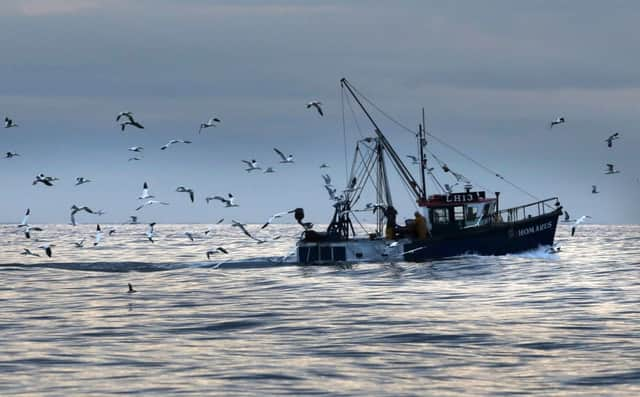Cameron has a chance to make it up to fishermen


You can’t make an omelette without breaking a few eggs, they say, and the European Union has turned out to be a far bigger omelette than anyone could have predicted at the outset. Anyone unlucky enough to spend time in the sprawling European Quarter in Brussels will readily appreciate just how far this project has come, for better or for worse.
Most member states will have at least some broken eggs to complain about, and the UK is no exception. Whatever Edward Heath was claiming 45 years ago, there were always going to be costs as well as benefits to joining what was then referred to as the Common Market. And for as long as we remain within the EU, we’ll just have to lump the costs and focus on the good bits.
Advertisement
Hide AdAdvertisement
Hide AdOr will we? It is tempting to dismiss the Prime Minister’s current bid to renegotiate some of the terms of UK membership as naive, doomed to failure or window-dressing politics. Harold Wilson “renegotiated” membership ahead of a similar referendum campaign in 1975; on the face of it, the current exercise is similarly vacuous. On the headline issues, such as the free movement of workers, David Cameron is unlikely to get very far, and will probably have to settle for vague promises to look at minor adjustments. He could well do better to focus on matters that have less to do with fundamental principles and more to do with righting past wrongs.
The sacrifice of much of our fishing industry, for example.
It would be hard to overstate the bitterness that our island and coastal communities still feel about the UK government’s decision in the early 1970s to concede the principle of “equal access” to fishing grounds. In a now famous memo touching on the potential catastrophe for our fishing industry, ministers were advised by officials that “in the wider UK context, [fishers] must be regarded as expendable”. And many of them were duly expended.
This is why Orkney and Shetland MP Alistair Carmichael has been pressing David Cameron to put fisheries on the EU reform agenda. In a recent parliamentary debate, Mr Carmichael and other MPs from constituencies with significant or once-significant-but-now-decimated fishing industries agreed that EU fisheries management had been a disaster. As Eilidh Whiteford of Banff and Buchan pointed out during the debate, the Common Fisheries Policy is unworkable, with “political ineptitude and bureaucracy” causing “untold damage to our fishing communities”.
This is a cross-party view, and something on which the industry itself can readily agree with environmental NGOs and fisheries scientists. It takes a mad sort of genius to ruin fishing communities and mismanage fish stocks all at the same time. Make no mistake: the gradual turnaround in fish stocks and the state of the industry in Scottish waters has been achieved despite Europe, not because of it.
So why not look again at that flawed settlement on fishing rights? If the UK is pushing against a brick wall on some of its asks, this one could actually get somewhere. Fishing barely registers in the grand European order of priorities, but it matters a great deal to some of our most isolated and fragile communities. Scotland alone lays claim to the fourth-largest sea area in the EU; countries like Hungary, Austria and the Czech Republic have no sea at all, but still vote on how we should manage it. Now there’s a good place to start. Why can’t fisheries policy be decided by countries that have fishing grounds?
Another area for reform would build on the regionalisation introduced in the CFP’s most recent iteration in 2013. Why should the European Union retain “exclusive competence” for the conservation of marine resources? Could that not be left to member states that actually have marine resources, and in regional groupings? Why should an MEP from a landlocked country decide what the Shetland fleet can and cannot do?
Unsurprisingly, many fishers would prefer us not to be in the EU at all. There can be no industry carrying as much red tape, or as many senseless rules and regulations.
It required unusual inspiration to come up with a quota system that forces fishing boats to discard perfectly marketable fish and then bans the practice without touching that system. And the Commission’s willingness to give away access to some of its richest waters to fleets from non-EU countries is not so much generous as masochistic.
Advertisement
Hide AdAdvertisement
Hide AdBut “In” or “Out” is for another day. In the meantime, the UK has a golden opportunity to make at least some amends to the communities and once-proud industry that paid the biggest price for EU membership in the first place.
You can’t unbreak eggs, but you might try and clear up some of the mess.
• Simon Collins, Executive officer, Shetland Fishermen’s Association www.shetlandfishermen.com